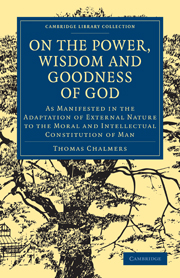 On the Power, Wisdom and Goodness of God
On the Power, Wisdom and Goodness of God Book contents
- Frontmatter
- Dedication
- NOTICE
- Contents
- PREFACE
- INTRODUCTORY CHAPTER
- PART I ON THE ADAPTATION OF EXTERNAL NATURE TO THE MORAL CONSTITUTION OF MAN
- CHAP. I FIRST GENERAL ARGUMENT
- CHAP. II SECOND GENERAL ARGUMENT
- CHAP. III THIRD GENERAL ARGUMENT
- CHAP. IV On the General Adaptation of External Nature to the Moral Constitution of Man
- CHAP. V On the Special and Subordinate Adaptations of External Nature to the Moral Constitution of Man
CHAP. IV - On the General Adaptation of External Nature to the Moral Constitution of Man
Published online by Cambridge University Press: 29 August 2010
- Frontmatter
- Dedication
- NOTICE
- Contents
- PREFACE
- INTRODUCTORY CHAPTER
- PART I ON THE ADAPTATION OF EXTERNAL NATURE TO THE MORAL CONSTITUTION OF MAN
- CHAP. I FIRST GENERAL ARGUMENT
- CHAP. II SECOND GENERAL ARGUMENT
- CHAP. III THIRD GENERAL ARGUMENT
- CHAP. IV On the General Adaptation of External Nature to the Moral Constitution of Man
- CHAP. V On the Special and Subordinate Adaptations of External Nature to the Moral Constitution of Man
Summary
1. It needs but a cursory observation of life to be made sensible, that man has not been endowed with a conscience, without, at the same time, being placed in a theatre which afforded the most abundant scope and occasion for its exercise. The truth is, that, in the multitude of fellow-beings by whom he is surrounded, and in the manifold variety of his social and family relations, there is a perpetual call on his sense of right and wrong—insomuch, that to the doings of every hour throughout his walking existence, one or other of these moral designations is applicable. It might have been stigmatized as the example of a maladjustment in the circumstances of our species, had man been provided with a waste feeling or a waste faculty, which remained dormant and unemployed from the want of counterpart objects that were suited to it. The wisdom of God admits of glorious vindication against any such charge in the physical department of our nature, where the objective and subjective have been made so marvellously to harmonize with each other; there being, in the material creation, sights of infinitely varied loveliness, and sounds of as varied melody, and many thousand tastes and odours of exquisite gratification, and distinctions innumerable of touch and feeling, to meet the whole compass and diversity of the human senses—multiplying without end, both the notice that we receive from external things, and the enjoyments that we derive from them.
- Type
- Chapter
- Information
- On the Power, Wisdom and Goodness of GodAs Manifested in the Adaptation of External Nature to the Moral and Intellectual Constitution of Man, pp. 158 - 187Publisher: Cambridge University PressPrint publication year: 2009First published in: 1834


